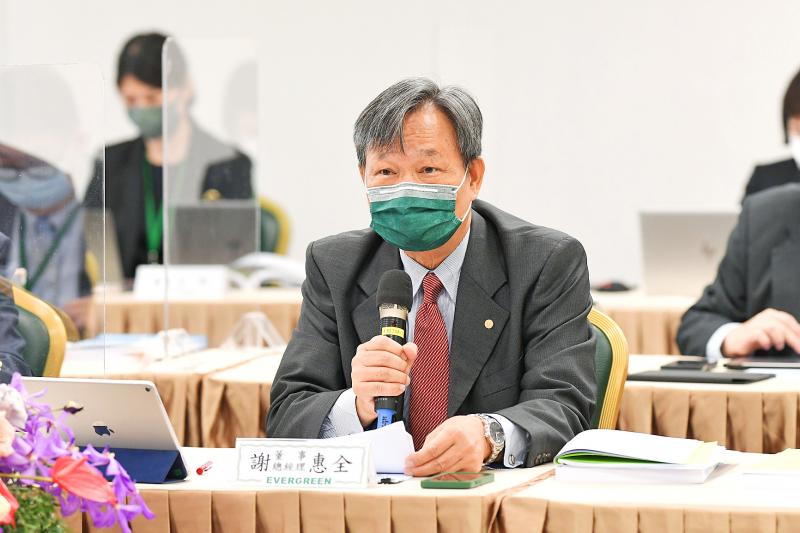Evergreen Marine Corp’s (長榮海運) proposed capital reduction was yesterday approved by shareholders, despite an objection from a major shareholder, Evergreen International Corp (長榮國際).
About 79 percent of the company’s shareholders attending its annual general meeting in Taipei approved the proposal, enabling Evergreen Marine to reduce its capitalization by 60 percent and return NT$31.7 billion to shareholders, or NT$6 per share, the company said.
Evergreen International Corp, which holds a 4.96 percent stake in Evergreen Marine, objected to the proposal, with its attorney, Wu Chu-chun (吳祝春), saying before the vote that if Evergreen Marine thinks its capital is more than sufficient, it should retire its treasury stocks rather than conduct a capital reduction.

Photo: CNA
Taiwan Depository and Clearing Corp (集保) data showed that about 260,000 minor Evergreen Marine shareholders own 516 million shares, with each shareholder owning 1,980 shares on average.
A conservative estimate shows that after the capital reduction, about 130,000 minor shareholders would each own fewer than 1,000 shares, and with this low number of shares, they would find it inconvenient to trade the stock on the market, Evergreen International said.
Evergreen International said that it doubted Evergreen Marine had decided to reduce its capital to benefit major shareholders.
“Is it possible that major shareholders who have purchased Evergreen Marine’s convertible bonds can take advantage of this opportunity and make significant profit from getting their cash back without paying any tax? Is it possible for them to obtain shares through their convertible bonds later and thus obtain a greater share of the profit that belongs to all shareholders?” Evergreen International said in a statement.
In response, Evergreen Marine vice president Wu Kuang-hui (吳光輝) said that the shipper decided to conduct the 60 percent capital reduction because its common stock equity would fall to 7 percent, in line with the ratios of other major global shippers.
“We made profits of NT$238.4 billion last year and NT$109.8 billion in the first quarter, and we will not purchase new vessels in the near term. We are reducing capital mainly to cut idle money,” Wu said.
The capital reduction would not prevent Evergreen Marine from implementing new investment plans and would not increase its capital in the short term, or it would face severe criticism from investors, he said.
At the shareholders’ meeting, Evergreen Marine president Eric Hsieh (謝惠全) said he still holds an upbeat outlook regarding the company’s revenue growth for the whole of this year, adding that inflation and Russia’s invasion of Ukraine should not affect the shipping industry significantly.
In addition, inflation would not stop consumers from buying daily necessities, and since sea liners mostly transport necessities, cargo demand would not slow down, while Russia and Ukraine do not make up a big share of the container market, Hsieh said.

SPEED OF LIGHT: US lawmakers urged the commerce department to examine the national security threats from China’s development of silicon photonics technology US President Joe Biden’s administration on Monday said it is finalizing rules that would limit US investments in artificial intelligence (AI) and other technology sectors in China that could threaten US national security. The rules, which were proposed in June by the US Department of the Treasury, were directed by an executive order signed by Biden in August last year covering three key sectors: semiconductors and microelectronics, quantum information technologies and certain AI systems. The rules are to take effect on Jan. 2 next year and would be overseen by the Treasury’s newly created Office of Global Transactions. The Treasury said the “narrow

SPECULATION: The central bank cut the loan-to-value ratio for mortgages on second homes by 10 percent and denied grace periods to prevent a real-estate bubble The central bank’s board members in September agreed to tighten lending terms to induce a soft landing in the housing market, although some raised doubts that they would achieve the intended effect, the meeting’s minutes released yesterday showed. The central bank on Sept. 18 introduced harsher loan restrictions for mortgages across Taiwan in the hope of curbing housing speculation and hoarding that could create a bubble and threaten the financial system’s stability. Toward the aim, it cut the loan-to-value ratio by 10 percent for second and subsequent home mortgages and denied grace periods for first mortgages if applicants already owned other residential

EXPORT CONTROLS: US lawmakers have grown more concerned that the US Department of Commerce might not be aggressively enforcing its chip restrictions The US on Friday said it imposed a US$500,000 penalty on New York-based GlobalFoundries Inc, the world’s third-largest contract chipmaker, for shipping chips without authorization to an affiliate of blacklisted Chinese chipmaker Semiconductor Manufacturing International Corp (SMIC, 中芯). The US Department of Commerce in a statement said GlobalFoundries sent 74 shipments worth US$17.1 million to SJ Semiconductor Corp (盛合晶微半導體), an affiliate of SMIC, without seeking a license. Both SMIC and SJ Semiconductor were added to the department’s trade restriction Entity List in 2020 over SMIC’s alleged ties to the Chinese military-industrial complex. SMIC has denied wrongdoing. Exports to firms on the list

ASE Technology Holding Co (ASE, 日月光投控), the world’s biggest chip assembly and testing manufacturing (ATM) service provider, expects to double its leading-edge advanced technology services revenue next year to more than US$1 billion, benefiting from strong demand for artificial intelligence (AI) chips, a company executive said on Thursday. That would be the second year that ASE has doubled its advanced chip packaging and testing technology revenue, following an estimate of more than US$500 million for this year. ASE is one of the major beneficiaries from the AI boom as Taiwan Semiconductor Manufacturing Co (TSMC, 台積電) is outsourcing production of advanced chip